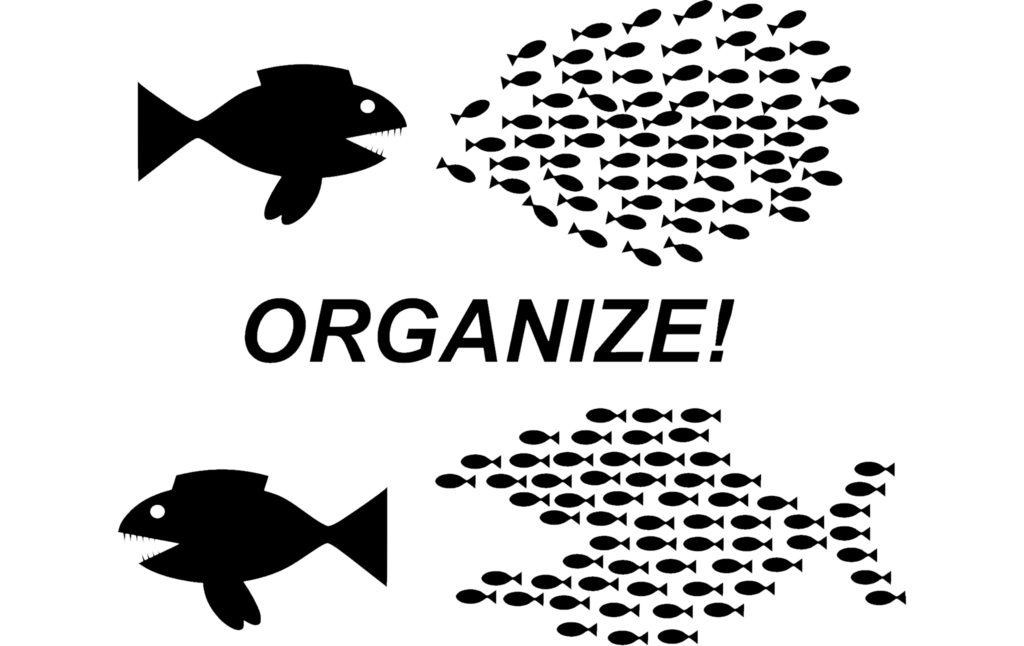
How To Organize
- You can start by googling “How to organize.” This will not be helpful, probably. Lots of tips about closets and bathrooms. “But what I want is an article that simply tells me how to organize. Isn’t that what this is, right here?” Not exactly. That’s not how organizing works.
- Refine your search to “how to organize for power.” Find a website with tons of history and resources, totally overwhelming. For something less overwhelming, find a Current Affairs interview with labor organizer Jane McAlevey. Read it.
- Understand that “organizing” is a way of organizing people. Knowing who people are, what motivates them, how they can be reached, and how they can be moved. So organizing is all about personal relationships.
- If you want, you can keep reading. There are lots of great books about organizing and labor history (McAlevey has written three of them), and they can really help you develop power analyses. But be advised: Reading isn’t organizing. You have to accept that organizing is not a thing you can learn how to do simply by reading this piece, or a Jane McAlevey book, or anything else.
- What is organizing? A proven method to build power through personal relationships. (Like a multi-level marketing scheme, you might ask? Yeah pretty much, only without the exploitation.) If you want to get involved in organizing, you should think about people you know and the context in which you know them.
- Think about your community and its political fights. For example, in New Orleans, we have a coalition of 21 organizations fighting for our convention center—which is sitting on hundreds of millions of dollars in a slush fund—to use that public money for workers’ relief. We have people fighting against a massive, unaccountable municipal surveillance system. We have fought against jail expansions and for tenants’ rights and affordable housing. There are many possible groups you could join and take part in their organizing. It’s overwhelming! How do you decide what cause is most important? (Many people quit at this point.)
- Here’s the part that will really help: Think about someone you know, who is already active in those groups, and ask them to organize you. Tell them you want to get involved.
- Commit to having a one-on-one call or meeting with that organizer within one week, and going to at least one meeting or action within the next four weeks.
- Keep going. Along the way, pay attention to what you like and dislike in the organization, as well as how welcome you feel. Help other people feel welcome. You might find out that you don’t really think this organization is effective or a good match, in which case you want to return to step six and try another.
- Congratulations, this is organizing!
Pro tip: Get ready to get uncomfortable. There will be a moment when you start and you want to quit. Someone will ask you to help with something that you don’t really want to do, like going to a meeting, writing a letter, or telling your friends about an action. And the most important thing to know is, when you feel that slight discomfort, question it, and resolve to do it anyway.
Organizing for power is all about doing things that feel slightly uncomfortable, whether it’s including the name of your employer on a political petition or outright asking your friends to join DSA. If it were easy, all the work would have been done already.
Organizing is about building accountable relationships, and a key part of accountability is humility and acceptance of discomfort. For example, it is uncomfortable to admit that DSA is, on the whole, whiter, younger, more well-off, more degreed, and more childless than the working class at large. But if you can’t accept that discomfort and work from accepted facts, you won’t get anywhere. That’s why “how do I find the article that tells me how to organize” won’t probably help you actually organize for power. Your power is in your ability to make and maintain accountable relationships.
TL;DR: We all have to learn to answer our phone even when we don’t recognize the number, call our congresspeople even if they’re terrible, and actually communicate face-to-face with humans we don’t already know and agree with.
The fact is that organizing is a condition. Sometimes you will feel more in touch with your community, and sometimes you will want to step back. Some weeks you’ll feel like you have endless capacity, and sometimes you will just want to quit. Most of organizing is just NOT quitting before doing any real work. It’s hard. Keep going.




